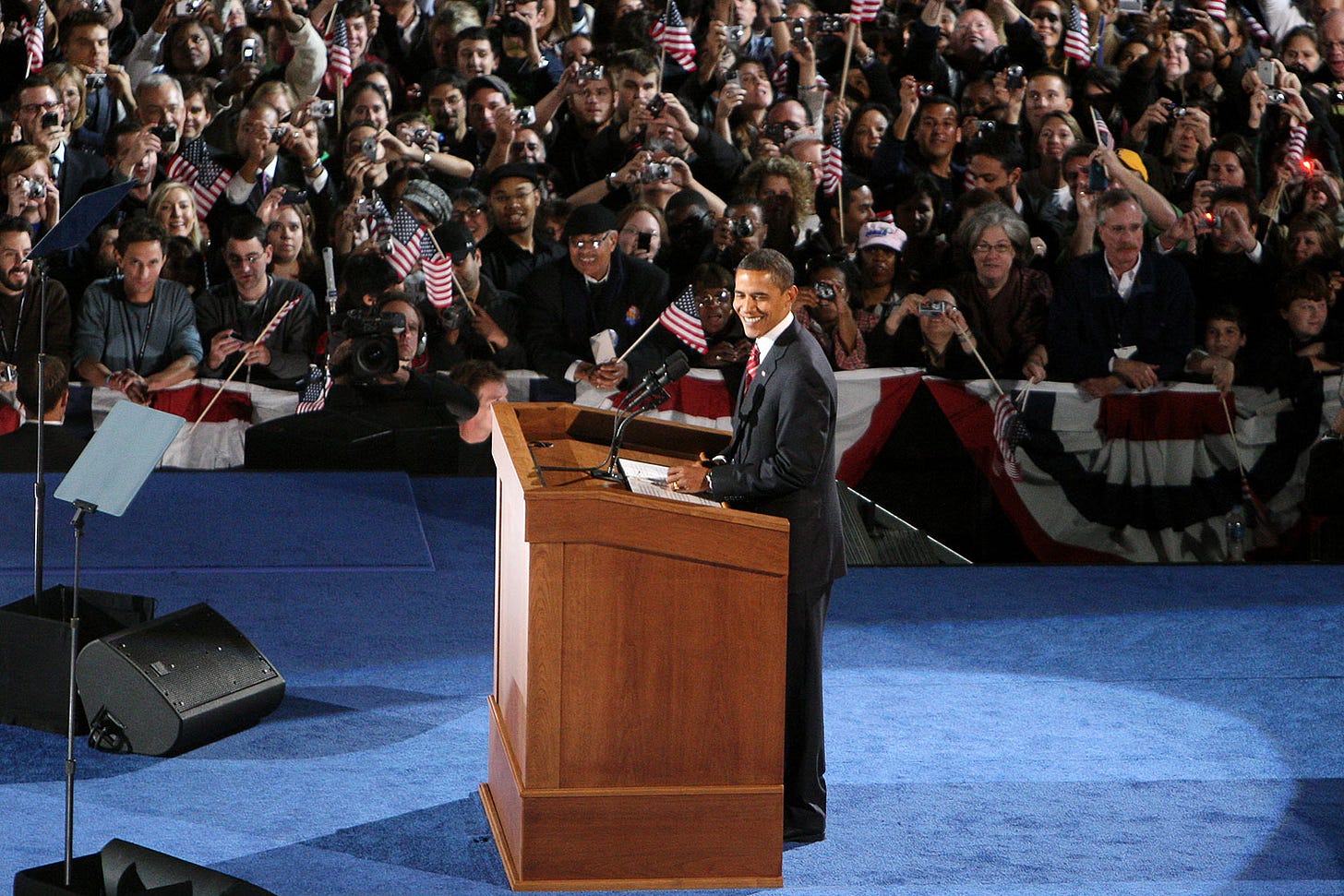It was 15 years ago today that Barack Obama won the 2008 election. After witnessing the last decade it is hard to believe there was once a time not long ago when I could derive hope from electoral politics. Looking at pictures of that night in Chicago where he gave his victory speech feels like taking a step into a ancient, lost world with unmet possibilities.
I had been living in Illinois when he ran for the Senate, drawing gushing support from a lot of people who did not ordinarily care about politics. In that election and when he ran for president it felt great to go into the polling station and pull the lever with enthusiasm rather than a resigned “well it could be worse” attitude.
In grad school in Illinois and in my friend groups in Michigan and Texas where I lived after, Obama was more than a politician. He symbolized the possibilities of change, of finally getting us out of the horrific rut of the Bush years. We had lived through 9/11, unnecessary failed wars, Katrina, and the beginning of the worst economic crisis since the Great Depression. Because politics has become even more partisan since then, it’s easy to forget how despised Dubya was at the end of his presidency. Unlike with Trump, conservatives had stopped making apologies for him. Obama coming into power seemed to be an amazing opportunity not least because the nation seemed to broadly welcome a major change.
Obama could never live up to the hype, and to this day I get irritated at people who are mad at him because he didn’t end up being the savior they had unrealistically expected him to be. I’m not here to relitigate Obama’s legacy, though. I am here to get us to think about that crucial moment in 2008 a little more, and to remember it honestly.
Beneath the media narratives about a “post-racial America,” there was a different reality that I saw with my own eyes. In November of 2008 I was living in Nacogdoches, Texas, having just moved there to take a job as a professor at a local university. The night of the election I went out with my friends to a local townie bar to have some beers and watch the election results. The TVs were showing the Mavericks game, except for one on mute showing the returns in the corner. When they declared Obama the winner we cheered, and then received some hard stares from the other patrons, who were obviously not pleased.
The anger in their eyes had us hitting the exits for a friend’s place where we watched Obama’s victory speech in jubilation. My friends from Texas and Georgia were especially giddy, one of them yelling “Fuck you South!” afterwards. We relished that the people giving us hard stares at the bar were so mad about a liberal Black man being president.
As the days passed, however, I felt more and more unsettled. It was obvious that a lot of people in rural Texas were not getting over it. The media was talking about a new consensus and the end of the long Reagan era, but I wasn’t seeing any of that in East Texas. When Limbaugh gave his infamous CPAC speech and Congressional Republicans started obstructing everything Obama did it became clear that this wasn’t just sour grapes. The 2008 election also had Sarah Palin and her talk of “Real America” and that was the future of the Republican Party.
Election night 2008 was a turning point, but not the one we thought. The media narrative was certainly right that Reaganite economic policy was no longer popular. Romney’s devotion to that creed sunk him in 2012, and Trump was the first to figure out that the Republican Party’s own base no longer really bought it. The Tea Party movement, whipped up to oppose Obama, was really about identity, not tax policy. The narrative about a “post-racial America” was completely wrong and pretty much the opposite of reality.
Since 2008 conservatives have gone all-in on identity politics and racial resentment. With their economic ideas thoroughly discredited, it’s their only path to victory. Fifteen years of beating this drum has lead to a party embracing bigoted demagogues like Trump and elevated election deniers with kooky religious politics into the House Speakership. On the other side of things, progressives have failed to sustain the sense of hope and excitement they marshaled in 2008. If anything, for us this anniversary is a sad one, a reminder of how brief and fragile our opportunity to turn things around turned out to be. These days I despair if we will ever get such an opportunity.



